Embark on a captivating journey through Vocabulary Unit 5 Level G, where words come alive and language unfolds its boundless potential. Designed for English language learners, this unit offers a treasure trove of essential vocabulary, equipping you with the linguistic tools to navigate diverse contexts with confidence.
Delve into the intricacies of word usage, explore effective memorization techniques, and engage in interactive activities that make vocabulary acquisition an enjoyable and enriching experience.
Vocabulary Unit 5 Level G Overview
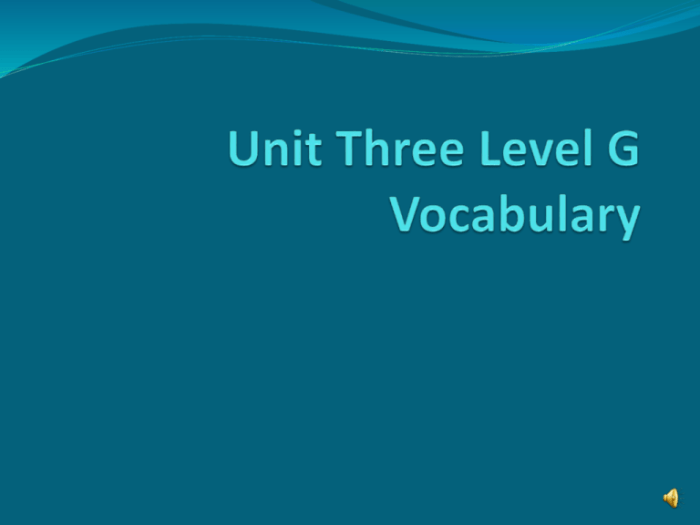
Vocabulary Unit 5 Level G is an essential milestone in your English language learning journey, designed to expand your vocabulary and enhance your communication skills.
This unit is targeted towards intermediate English learners who aim to develop a strong foundation in academic and formal language. The learning objectives of this unit include:
- Expanding vocabulary in various academic domains
- Improving comprehension of complex texts
- Enhancing writing skills through precise word usage
- Developing confidence in using sophisticated vocabulary
Key Vocabulary Words
This unit covers a diverse range of key vocabulary words, including:
- Abstract concepts (e.g., empathy, altruism)
- Academic jargon (e.g., hypothesis, methodology)
- Formal synonyms (e.g., commence instead of start)
- Transition words (e.g., however, consequently)
- Figurative language (e.g., metaphors, similes)
Vocabulary Acquisition Strategies
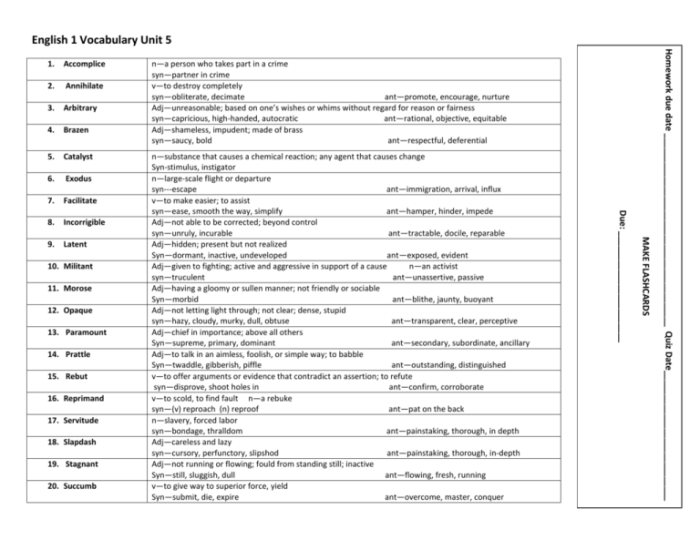
Expanding your vocabulary is essential for effective communication. Various strategies can enhance your vocabulary acquisition. These include techniques that facilitate memorization, foster understanding, and promote active engagement with new words.
Spaced Repetition
Spaced repetition involves reviewing new words at increasing intervals. This helps strengthen memories and reduces forgetting. Use flashcards or apps that implement spaced repetition algorithms to optimize your review schedule.
Active Recall
Active recall challenges you to retrieve words from memory without relying on cues. This strengthens neural connections and improves long-term retention. Practice active recall by testing yourself regularly, using methods like writing down words from memory or using online quizzes.
Contextual Learning
Understanding words in context is crucial. Read widely and pay attention to how words are used in different contexts. This helps you grasp the nuances of word meanings and their appropriate usage.
Flashcards and Word Lists
Flashcards and word lists provide a structured way to memorize new words. Create flashcards with the word on one side and its meaning and/or example on the other. Regularly review your flashcards to reinforce learning.
Vocabulary unit 5 level g includes a variety of dental terms, including buccal pits. If you’re wondering “is a buccal pit a cavity?”, check out this helpful article: is a buccal pit a cavity . It explains the difference between buccal pits and cavities, and provides tips for keeping your teeth healthy.
Returning to vocabulary unit 5 level g, we’ll continue exploring dental terminology and its importance in understanding oral health.
Word Usage and Application
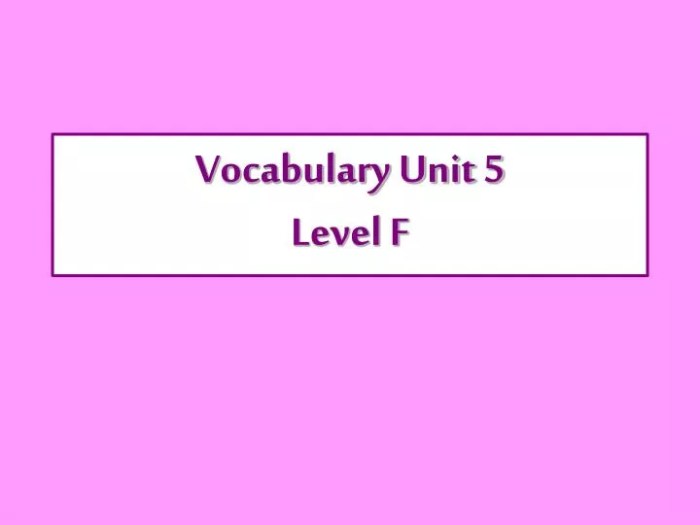
Vocabulary words are like tools in a toolbox; they are useless unless you know how to use them. In this section, we will explore different ways to use the vocabulary words from Unit 5 Level G in different contexts. We will also discuss the nuances and subtleties of word usage, including synonyms, antonyms, and homonyms.
One of the best ways to learn how to use new words is to see them used in context. Here are some examples of sentences and phrases that illustrate the correct usage of the vocabulary words from Unit 5 Level G:
- The aberrantbehavior of the child worried the parents.
- The auspiciousoccasion was celebrated with great joy.
- The benevolentking donated his wealth to the poor.
- The capriciousweather made it difficult to plan outdoor activities.
- The ephemeralbeauty of the flowers was a reminder of the fleeting nature of life.
As you can see, the vocabulary words from Unit 5 Level G can be used in a variety of different contexts. By understanding the meaning of these words and how to use them correctly, you can expand your vocabulary and improve your communication skills.
Synonyms, Antonyms, and Homonyms
Synonyms are words that have the same or similar meanings. Antonyms are words that have opposite meanings. Homonyms are words that have the same spelling or pronunciation but different meanings.
Here are some examples of synonyms, antonyms, and homonyms from Unit 5 Level G:
- Synonyms: aberrant(unusual), auspicious(fortunate), benevolent(kind), capricious(unpredictable), ephemeral(temporary)
- Antonyms: aberrant(normal), auspicious(unfortunate), benevolent(cruel), capricious(predictable), ephemeral(permanent)
- Homonyms: fair(just), fair(light-skinned), bank(financial institution), bank(side of a river)
Understanding the relationships between synonyms, antonyms, and homonyms can help you to use vocabulary words more effectively. For example, if you know that the word aberrantmeans unusual, you can use the synonym unorthodoxto convey the same meaning. Similarly, if you know that the word auspiciousmeans fortunate, you can use the antonym unfortunateto convey the opposite meaning.
Vocabulary Building Activities
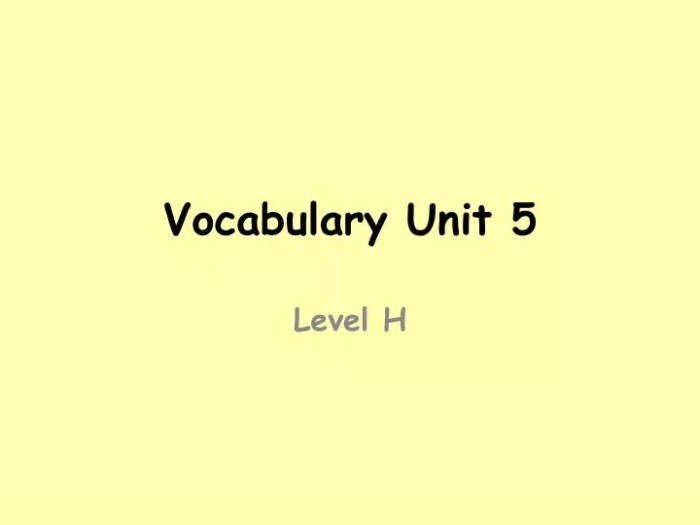
To enhance vocabulary learning and ensure retention, engaging and interactive activities are crucial. These activities should not only reinforce the meanings and usage of new words but also test students’ understanding and make learning enjoyable.
Incorporating exercises that focus on word meanings, usage, and spelling helps students develop a comprehensive understanding of the vocabulary. These exercises can include fill-in-the-blank sentences, matching exercises, and word puzzles that challenge students to apply their knowledge.
Vocabulary Games, Puzzles, and Quizzes
To make learning more enjoyable and engaging, vocabulary games, puzzles, and quizzes can be organized. These activities provide a fun and interactive way for students to test their vocabulary skills and reinforce their understanding. Some popular games include word scrambles, crosswords, and charades, which encourage students to think creatively and use their vocabulary in different contexts.
Assessment and Evaluation
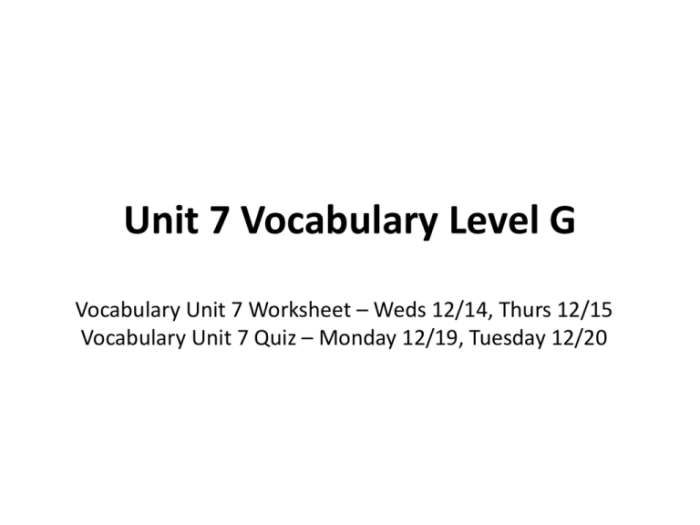
Assessing students’ vocabulary knowledge is crucial for monitoring their progress and tailoring instruction to their individual needs. It helps teachers identify areas where students excel and where they need support.
Various methods can be employed for vocabulary assessment, each with its advantages and disadvantages. Written tests, such as multiple-choice questions or fill-in-the-blank exercises, allow for efficient evaluation of a wide range of vocabulary items.
Oral Quizzes
Oral quizzes, such as asking students to define or use words in context, provide opportunities for students to demonstrate their understanding in a more interactive and spontaneous manner.
Portfolio Submissions, Vocabulary unit 5 level g
Portfolio submissions, where students collect samples of their writing or projects that showcase their vocabulary usage, offer a comprehensive assessment of students’ vocabulary development over time.
Interpreting assessment results involves analyzing students’ performance patterns and identifying areas where they demonstrate proficiency or need additional support. This information can be used to inform instructional decisions, such as providing targeted vocabulary instruction or designing differentiated activities.
Common Queries
What is the significance of Vocabulary Unit 5 Level G?
Vocabulary Unit 5 Level G plays a crucial role in expanding your English vocabulary, enhancing your ability to express yourself effectively and comprehend complex texts.
How can I effectively memorize new vocabulary words?
Active recall, spaced repetition, and context-based learning are proven techniques for enhancing vocabulary memorization.
What types of activities can reinforce vocabulary learning?
Interactive games, puzzles, and quizzes can make vocabulary learning enjoyable and engaging.